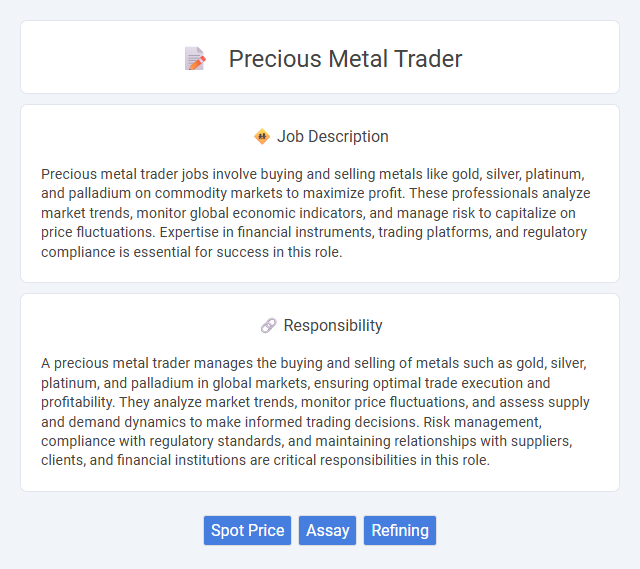
Precious metal trader jobs involve buying and selling metals like gold, silver, platinum, and palladium on commodity markets to maximize profit. These professionals analyze market trends, monitor global economic indicators, and manage risk to capitalize on price fluctuations. Expertise in financial instruments, trading platforms, and regulatory compliance is essential for success in this role.
Individuals with strong analytical skills and a high tolerance for risk are likely suited for a precious metal trader role, as it requires quick decision-making in volatile markets. Those who can manage stress effectively and have a keen interest in global economic trends may find this job aligns well with their abilities. However, people who prefer routine and low-pressure environments might find the demands of this profession challenging.
Qualification
Precious metal traders require strong analytical skills and in-depth knowledge of commodity markets, particularly gold, silver, platinum, and palladium. A bachelor's degree in finance, economics, business, or a related field is typically essential, along with proficiency in market analysis tools and trading platforms. Experience in risk management and a keen understanding of global economic indicators also enhance a trader's ability to make informed investment decisions in precious metals.
Responsibility
A precious metal trader manages the buying and selling of metals such as gold, silver, platinum, and palladium in global markets, ensuring optimal trade execution and profitability. They analyze market trends, monitor price fluctuations, and assess supply and demand dynamics to make informed trading decisions. Risk management, compliance with regulatory standards, and maintaining relationships with suppliers, clients, and financial institutions are critical responsibilities in this role.
Benefit
A precious metal trader job likely offers the benefit of high earning potential due to fluctuating market prices and commission-based compensation structures. Traders may gain valuable exposure to global financial markets and develop expertise in commodity trading strategies. Access to a dynamic work environment could also enhance decision-making skills and professional networking opportunities.
Challenge
Working as a precious metal trader likely involves navigating volatile markets where prices can shift rapidly due to geopolitical events and economic indicators. The challenge probably lies in accurately forecasting market movements and managing risks to maximize profits while minimizing losses. Traders must continuously analyze data and market trends, which requires sharp analytical skills and the ability to make swift decisions under pressure.
Career Advancement
Precious metal traders develop expertise in market analysis, pricing, and risk management, enabling progression to senior trading roles or portfolio management positions. Mastery of precious metals like gold, silver, platinum, and palladium markets enhances opportunities for leadership roles within commodity trading firms or financial institutions. Advanced certifications and consistently strong performance can accelerate career advancement toward executive-level positions in the global metals trading industry.
Key Terms
Spot Price
A Precious Metal Trader specializes in buying and selling metals like gold, silver, platinum, and palladium based on real-time market conditions. The role requires monitoring the spot price, which reflects the current market value for immediate delivery, crucial for making timely and profitable trades. Mastery of market trends, geopolitical factors, and economic indicators affecting spot prices is essential to maximize gains and manage risk effectively.
Assay
A precious metal trader relies heavily on accurate assay results to determine the purity and value of metals like gold, silver, and platinum. Precise assay techniques such as fire assay and X-ray fluorescence ensure reliable valuation for trading decisions and risk management. Proficiency in interpreting assay reports directly impacts profitability and market competitiveness in the precious metals trading sector.
Refining
A precious metal trader specializing in refining manages the procurement and sale of raw metals such as gold, silver, platinum, and palladium, ensuring their quality meets market standards through precise assay processes. This role involves close collaboration with refineries to verify metal purity, optimize refining techniques, and maximize recovery rates, directly influencing commodity pricing and profit margins. Expertise in regulatory compliance, market trends, and supply chain logistics is essential for profitable trading and maintaining trust with clients and refining partners.
 kuljobs.com
kuljobs.com